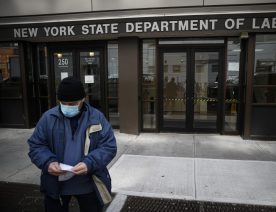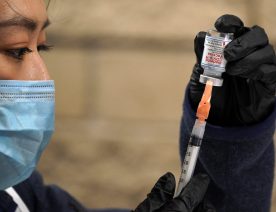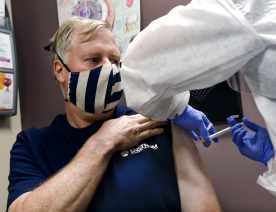
March 11, 2021
A year into the coronavirus pandemic, 19% of Americans report having a close friend or relative that has died from the virus. Sixty-seven percent are at least somewhat worried that they or a member of their household will contract COVID-19, and 65% always wear a mask around other people outside the home.
Two-thirds of the public think Americans have not taken the pandemic seriously enough. And there is strong support for requiring people to wear face masks.
As the national government works to maintain a vaccination rate of 2 million shots per day, the majority of Americans say it is important that vaccines are distributed fairly. However, few are confident that this is currently the case. Similarly, most say that it is important that vaccines are being given first to people who need it most, but fewer are confident that is happening.
Most Americans continue to be at least somewhat worried about the virus. Concern was highest in March 2020 as the country first faced the coronavirus, and then again in July as many parts of the South and West faced surges. Since October, about three-quarters have been at least somewhat worried, including about 4 in 10 extremely or very worried. In the wake of the vaccine rollout, worries about contracting COVID-19 have dropped.
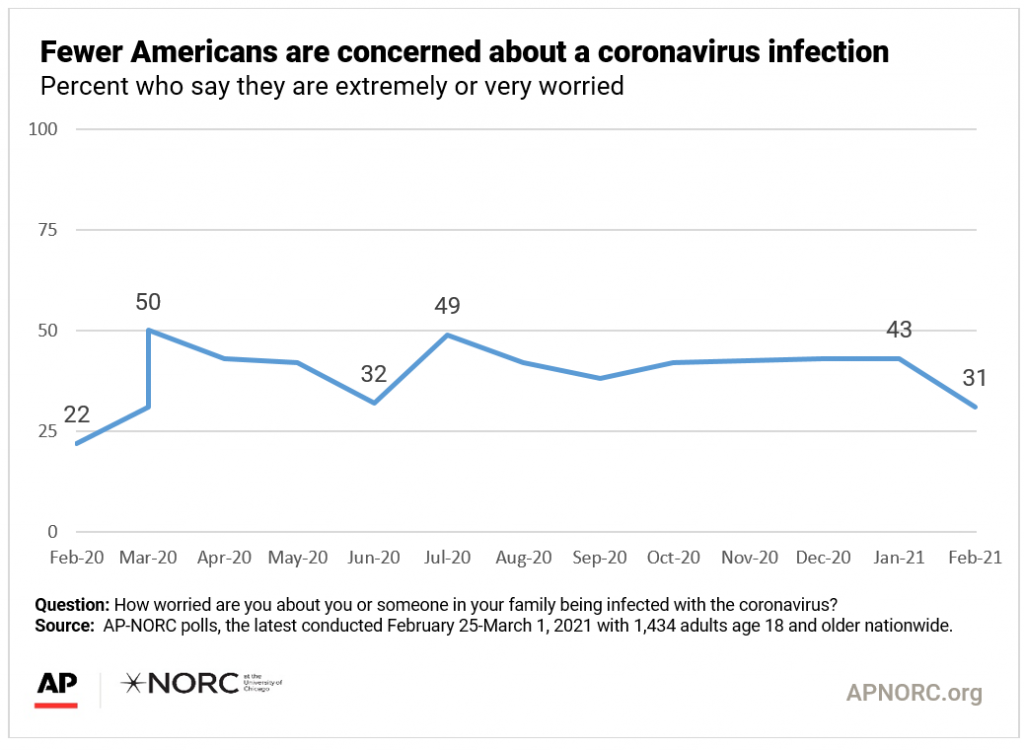
Still, Democrats remain more concerned than Republicans that they or someone in their household will be infected. In January, 58% of Democrats and 25% of Republicans were extremely or very worried about a COVID-19 infection in their household. Now 42% of Democrats and 18% of Republicans are extremely or very worried.
The impact of COVID-19 has been especially severe among Black and Hispanic Americans, with about 3 in 10 saying they have a close friend or relative who has died from the coronavirus since March 2020. People who know a victim of the virus are also more inclined to worry about someone in their household contracting COVID-19.
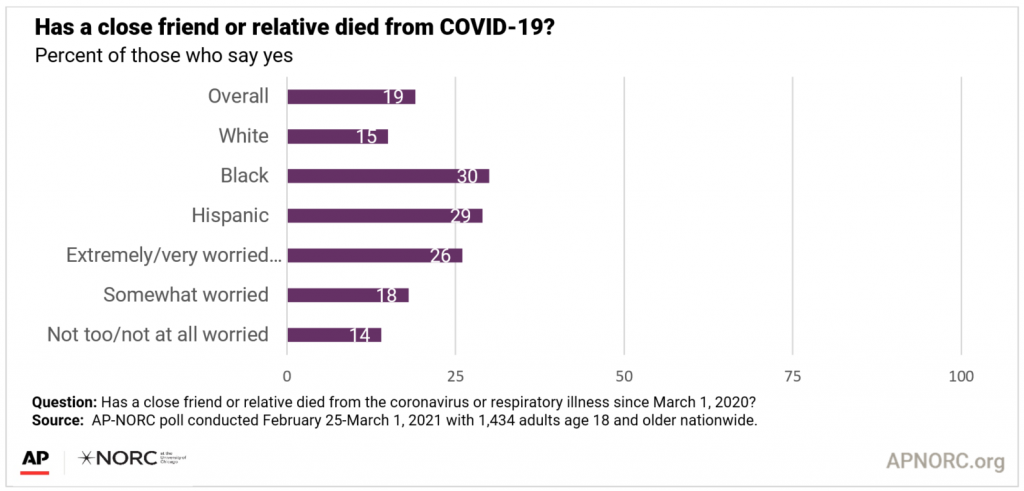
Two-thirds of the public think Americans have not taken the pandemic seriously enough. They are divided on whether people in their local community and people around the world reacted appropriately or minimized the problem. Few think there was any overreaction. Democrats are more likely than Republicans to say the pandemic was not taken seriously enough.
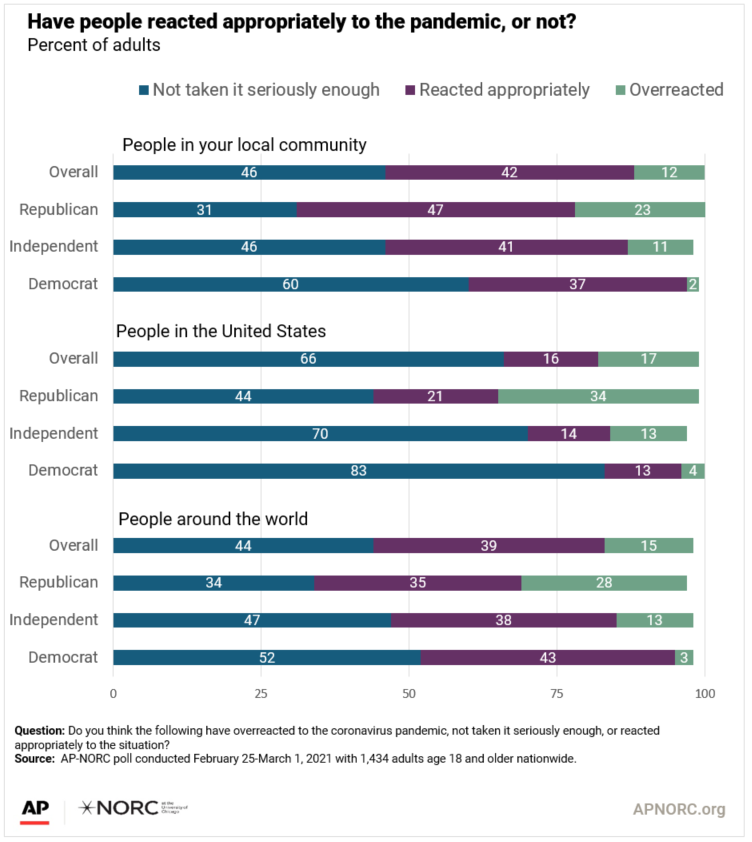
Seventy percent of Americans approve of Biden’s handling of the coronavirus pandemic – the issue for which he receives the highest marks. Forty-four percent of Republicans support his handling of the pandemic, more than any other issue.
Last spring, the public held considerably more favorable opinions of how their state and local officials had been handling the coronavirus outbreak compared to federal officials and Congress. But views of state and local handling of the pandemic have dropped.
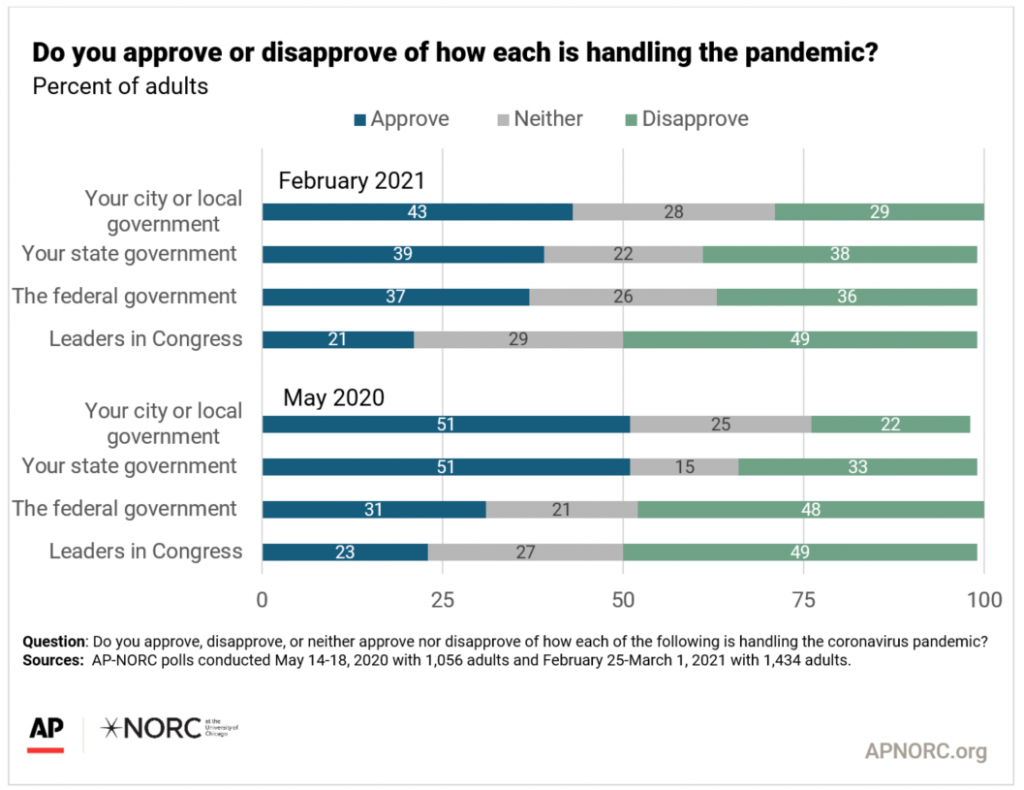
Only 25% say their local community is doing a good job in handling the sign-up process for getting COVID-19 vaccines, and 31% feel like their local K-12 schools are handling COVID well. More, 46%, think their local public health officials have done a good job communicating the safety and effectiveness of COVID-19 vaccines.
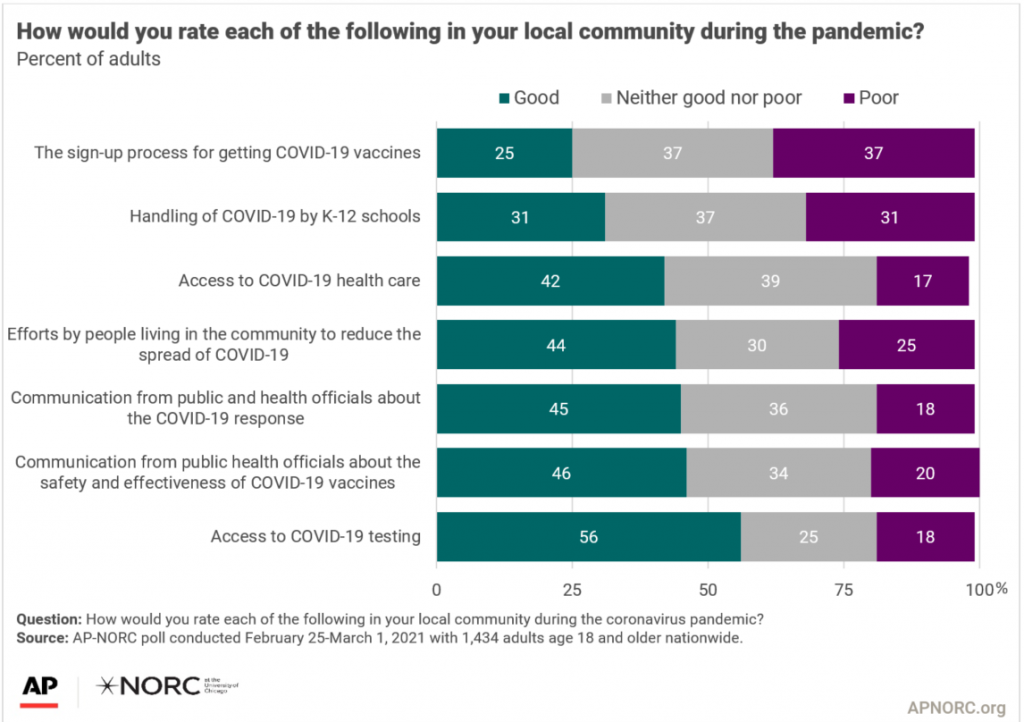
Sixty-nine percent favor requiring Americans to wear face masks outside the home around other people. College graduates, people age 45 and older, and Democrats are more likely to support wearing face masks.
Most people have delayed medical and dental care during the pandemic. People who are extremely or very worried that they or someone in their household will contract COVID-19 are more likely to delay medical or dental treatment than those who are less concerned.
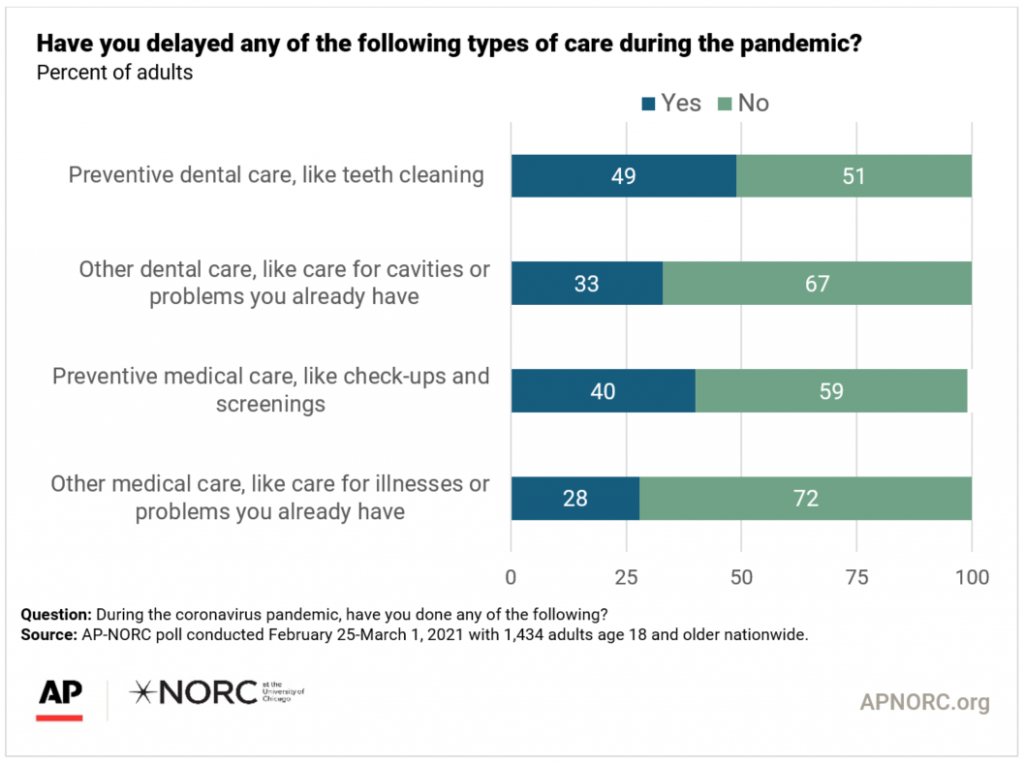
As states begin to lift restrictions put in place to curb the coronavirus outbreak, most Americans report high levels of compliance with social distancing and mask wearing.
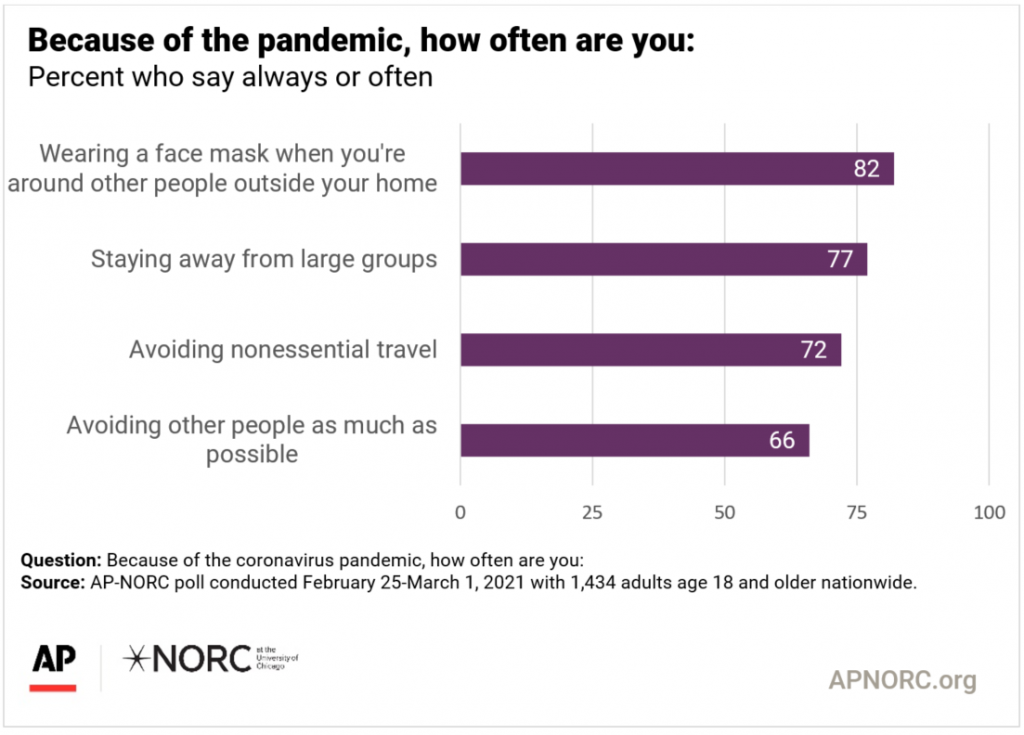
In addition to wearing masks and practicing social distancing, many Americans either have or plan to get immunized against the virus. Twenty-two percent report receiving a vaccine already and another 30% say they will definitely get one once it is available to them. Thirty-three percent are on the fence including 17% who say they probably will get vaccinated and 15% who say they probably won’t. Fifteen percent report they definitely will not get vaccinated.
More Democrats than Republicans have already been inoculated or intend to get the vaccine when it’s made available to them. Only 10% of independents have been immunized yet, probably because they tend to be younger than those who identify as Republican or Democratic. College graduates are more likely than those less educated to say they have or would receive the vaccine. Older generations are more likely to say they have or definitely would be immunized than younger ones. Black and Hispanic Americans are less likely to say they have been or definitely will be inoculated than white Americans.
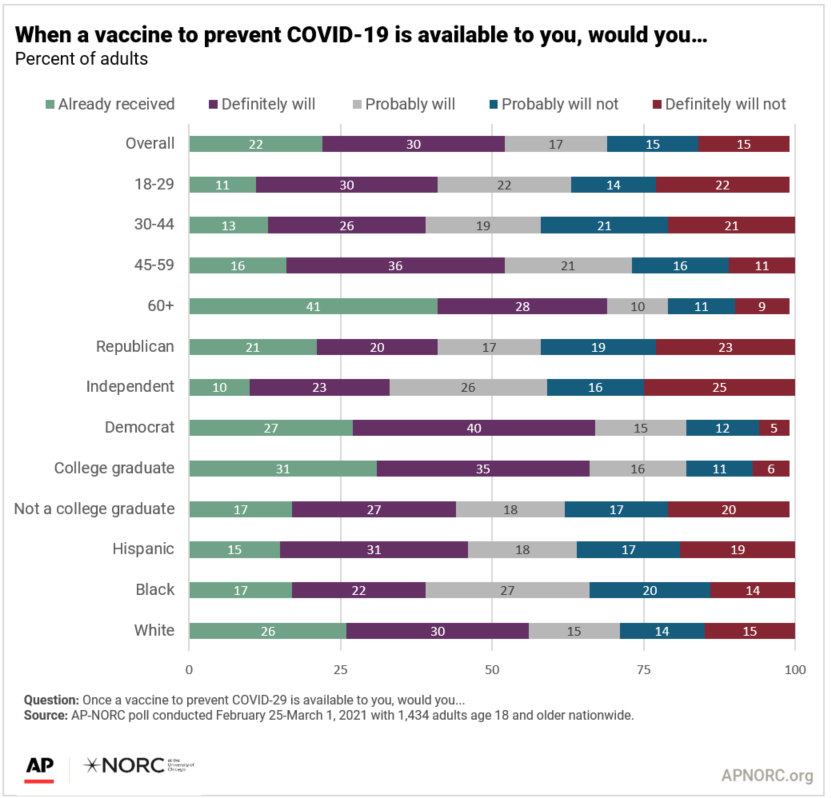
Most who say they are hesitant about getting vaccinated or who have received the vaccine but do not intend to get all the required doses cite concerns about possible side effects (57%) and nearly half (48%) plan to wait and see if it is safe and may get it later.
Twenty-three percent do not think they need a COVID-19 vaccine. Republicans (29%) and independents (25%) and much more likely than Democrats (12%) to say they do not need to be inoculated against COVID-19. About half of those who haven’t received the vaccine and don’t plan on it have faith in the strength of their immune system and many do not think COVID-19 is a serious illness.
A quarter of the public find it difficult to locate facts about COVID-19 vaccines and have a hard time understanding the difference between fact and opinion. Thirty percent say it is difficult figuring out whether or not information about the COVID-19 vaccines is true.
More than 7 in 10 adults say it is important that the vaccines were properly tested for safety and effectiveness, being distributed fairly, quickly, and safety, and that priority is being given to those who need it most.
However, few have much confidence that the vaccines were tested properly or distributed fairly.
While still low, confidence that the COVID-19 vaccines were properly tested for safety and effectiveness has increased compared with perceptions in December. In a December AP-NORC poll, 28% were extremely or very confident that when a vaccine becomes available, it will have been properly tested for safety and effectiveness; now 39% believe the vaccines have been properly tested. There has been no significant increase in whether the vaccines will be distributed fairly, quickly, or safely.
Of those who say it is extremely or very important that the COVID-19 vaccines were properly tested, but have little or no confidence that the testing was done, 75% say they probably or definitely will not get inoculated against the virus.
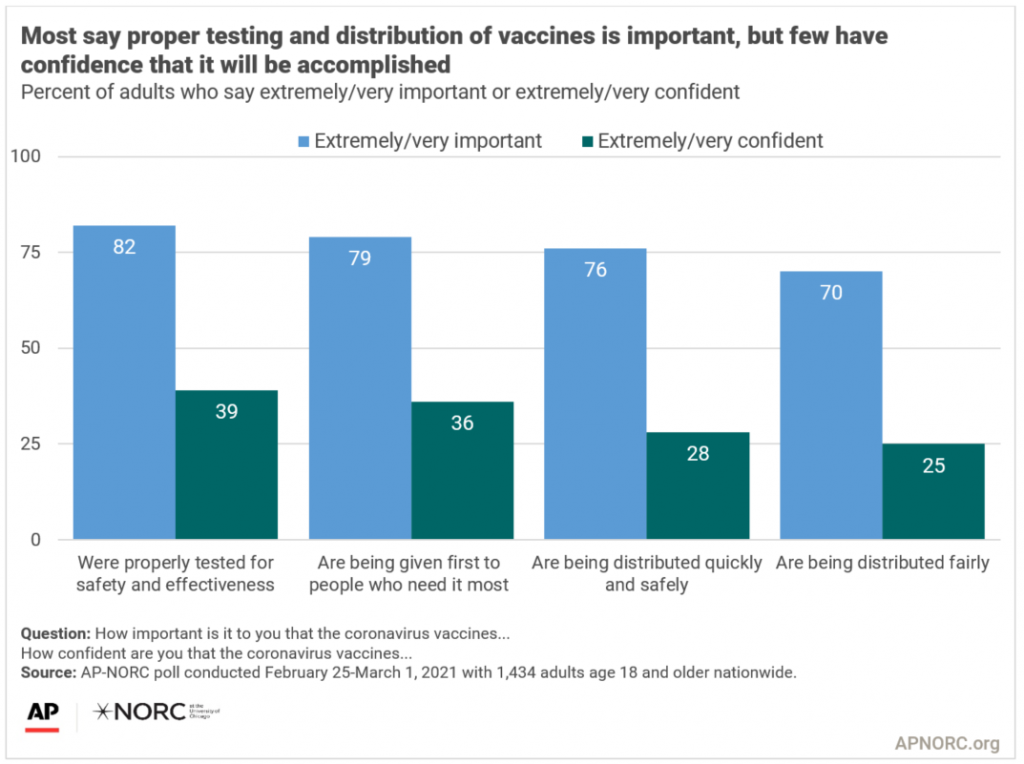
The nationwide poll was conducted February 25-March 1, 2021 using the AmeriSpeak® Panel, the probability-based panel of NORC at the University of Chicago. Online and telephone interviews using landlines and cell phones were conducted with 1,434 adults. The margin of sampling error is +/- 3.4 percentage points.
- Suggested Citation: AP-NORC Center for Public Affairs Research. (March 11, 2021).“The Coronavirus Pandemic: One Year Later.” [apnorc.org/projects/the-coronavirus-pandemic-one-year-later]





